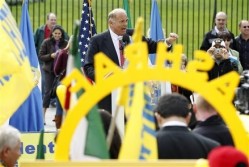An End to Impunity for MEK Boosters?
March 16, 2012

In a controversial 6-3 ruling on Holder vs. Humanitarian Law Project in 2010, the U.S. Supreme Court upheld the executive’s right under the USA PATRIOT Act to prosecute individuals or groups deemed to have provided “material support” to any organization classified by the U.S. State Department as a terrorist organization—including for nonviolent advocacy that would otherwise be protected by the First Amendment, if the accused can be shown to have worked in concert with or at the behest of a proscribed organization.
In practice, notes Glenn Greenwald, this has amounted to a wave of prosecutions against young Muslim men for making Internet postings critical of U.S. foreign policy or in praise of alleged anti-American terrorists. It has also frustrated activists working to help terrorist-designated organizations in Turkey and Sri Lanka lodge international human rights complaints as a means of redressing their grievances nonviolently.
But the feds may be ready to add a higher-profile name to the list in former Pennsylvania Gov. Ed Rendell, an avid (and highly compensated) advocate for the Muhajedin-e Khalq (MEK). Rendell recently disclosed that the U.S. Treasury Department was investigating his speaking agency for payments he received on behalf of the group. Rendell insists that he spoke his own views and received no money or input from MEK’s leaders, although he does not deny receiving large payments from supportive organizations.
U.S.-based apologists for MEK, an exiled Iranian group that fiercely opposes the country’s clerical regime and has for many years been on the U.S. State Department’s list of terrorist organizations, had previously received a pass on prosecutions since Holder, even as far more marginal figures were prosecuted for much lower-profile advocacy of other causes.
Many hawkish U.S. pundits and pressure groups have embraced the group as Iran’s “legitimate opposition” and urged the State Department to remove MEK from its list of terrorist organizations. Groups like Raymond Tanter’s Iran Policy Committee exist solely for this purpose, but they are hardly alone. MEK and an apparently well-heeled community of supporters have shelled out considerable sums to enlist the support of scores of prominent Washington figures, including Rendell, former Rep. Patrick Kennedy, former Vermont Gov. Howard Dean, former CIA Directors Porter Goss and James Woolsey, former U.S. ambassador to the UN John Bolton, former New York Mayor Rudy Giuliani, and a host of others.
A Christian Science Monitor report from 2010 quoted a State Department official describing how MEK representatives would approach recently retired Washington politicos to solicit their backing: “Your speech agent calls, and says you get $20,000 to speak for 20 minutes. They will send a private jet, you get $25,000 more when you are done, and they will send a team to brief you on what to say.” All this high-profile support for an apparently active Iranian terrorist group inevitably raised questions about why human rights activists and lonesome Internet pontificators should suffer the wrath of the U.S. government while well-heeled politicos were appearing with MEK officials and accepting large sums to advocate for the group with apparent impunity.
MEK has aroused considerable antipathy in Iran for its often violent opposition to the country’s regime, including serving on the Iraqi side of the Iran-Iraq war. Indeed, much to the chagrin of its U.S. backers, MEK has been disavowed by Iran’s opposition Green Movement. In Iraq, where the cultish group maintains an embattled encampment outside Baghdad, the organization is widely despised for its complicity in Saddam Hussein’s massacres of Iraq’s Shiites and Kurds.
Prior to Iran’s Islamic revolution, MEK was an active participant in a violent campaign against the shah’s rule, during which time the group killed several Americans considered close to the regime. More recently, although MEK claims to have disavowed terrorism, U.S. officials have linked the group to Israeli efforts to sabotage and attack Iranian nuclear facilities, killing several Iranian scientists in the process.
Shilling for the MEK is apparently seen by Washington insiders as a low-risk and lucrative way to push for regime change in Iran, particularly when linked to the separate but often conflated issue of the human rights situation at the group’s Ashraf encampment in Iraq. Whatever the result of Rendell’s investigation (which is admittedly curious for its isolation), and whatever the merits of the Holder ruling or MEK’s status itself, future political retirees might think twice before doubling down on a terrorist group with few friends in either Iran or Iraq. Surely there are less legally troublesome opportunities in less bloody enterprises.
–Peter Certo
